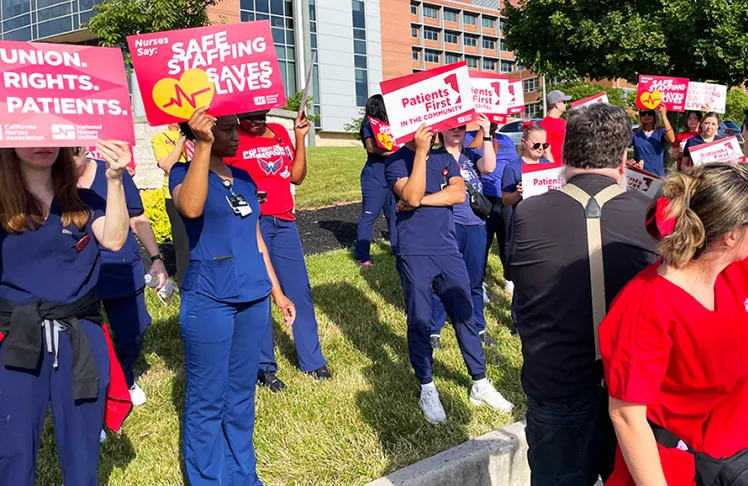
Nurses at a Baltimore hospital that treats low-income patients launched a one-day strike Thursday against the company that operates it — a dramatic move they believe can pressure the hospital into addressing years-long frustrations over unsafe staffing levels, high nurse turnover, and inadequate patient care.
The strike at Ascension Saint Agnes Hospital comes during contentious, 18-month-long negotiations between Missouri-based Ascension Health and the national union that represents the nurses. This is the first time caregivers in Baltimore have walked off the job.
The nurses say poor working conditions at the hospital put them under unnecessary stress and endangers the hospital’s patients — a disproportionate number of whom are Black.
“Suboptimal” Patient Care Is Not OK
“Hospital management told us that they are OK with ‘suboptimal’ patient care when we brought this issue to the bargaining table,” Gideon Eziama, a cardiology nurse, said in a statement issued by the nurses’ union, National Nurses Organizing Committee/National Nurses United. “That is completely unacceptable, and that is why we are striking.”
Ascension Health “is continuously over-reliant on floating nurses to other units to plug the staffing holes they intentionally create,” said Eziama, referring to a management practice of sending nurses to work in unfamiliar, short-handed departments. “But the hospital is not consistently tracking nurses’ competencies and assigns us to work in units we often aren’t trained to work in.”
RELATED: Black Nurses Are Traumatized by Racism in Healthcare
Hospital officials insist quality patient care is its “top priority” and that it is “fully prepared” to weather the strike. “A comprehensive contingency plan is in place to ensure there is no disruption in care or service for those we are privileged to serve,” according to a statement.
While this is a short-term strike, the action underscores a growing nationwide trend: nursing shortages at hospitals, burnout among nurses still on the job and management more focused on the bottom line than providing quality medical care.
Symptoms of a Bigger Problem
Experts say the overall nurse shortage stems from a combination of factors — chiefly, the COVID-19 pandemic, which compelled nurses to work long hours in an uncertain environment. But others blame long-term issues like poor working conditions, low pay, increasing workloads and lack of support from hospital management.
In November 2023, the nurses at Ascension St. Agnes became the first in Baltimore to unionize, and have been in talks with management since January 2024. The roughly 600 nurses at the hospital who are union members voted unanimously in May to authorize the strike; they say Ascension Health has turned a deaf ear to nurses’ concerns about staffing, patient safety, and burnout.
More than 10 percent of Saint Agnes’ nursing staff have resigned since April.
The nurses followed their profession’s standard practice of giving at least 10 days of advance notice of the strike. This gave Ascension St. Agnes, most of whose patients are on public insurance, the ability to make alternative plans for patient care.
“The bottom line is always patients,” Robin Buckner, a union member who has worked at St. Agnes for a decade and has 40 years of nursing experience, told Word in Black. “We are trying to make the conditions better so we can better take care of our patients.”
As an IV therapist, Buckner administers medicine to patients including painkillers, and serves all units in the hospital. She says she’s had plenty of opportunities to see how short staffing has affected patients and nurses alike.
“Back in the day we had enough staff, enough nurses per patient,” says Buckner. But that’s changed in recent years.
“How sick [patients] are does not seem to play a part in how the administration wants to staff the floor,” she says. “If a nurse has a complete [patient load], it’s really hard for her to be able to help somebody else who also has [patients] in an area that they’re not familiar with.”
There’s also management’s practice of scheduling fewer nurses to work at night, even though the number of patients is the same.
The union stresses that chronic understaffing and poor working conditions are pushing nurses away from bedside care. Roughly 1 million licensed nurses in the U.S. are currently not working in the profession, union officials say.
The shortage and staffing issues are happening worldwide, according to the World Health Organization. While 12% of the U.S. population is Black, only 6.3% of RNs are Black.
Ascension is a non-profit and Catholic health system that says it provided more than $2 billion worth of health services to “persons living in poverty and other community benefit programs” in 2024. The healthcare network operates in 16 states and the District of Columbia.
A 2022 Wall Street Journal investigation found Ascension opened facilities in wealthier neighborhoods where households have higher rates of private insurance and closed hospitals serving low-income neighborhoods and communities where insurance coverage rates are below area median levels.
In January 2023, Travis County, Texas, sued Ascension-owned Dell Seton Medical Center for breach of contract for not keeping “its commitments to…the low-income Travis County residents who depend on Central Health for healthcare services.”
The following month, Sen. Tammy Baldwin, a Wisconsin Democrat, wrote a letter to CEO Joseph Impicciche questioning Ascension’s nonprofit status and values after two investigations found “disruptions to patient care, long wait times in the emergency department, delayed surgeries and staff concerns about patient safety” and the closure of a labor and delivery unit at two Ascension hospitals in Milwaukee’s south side.
“Instead of investing in nursing staff, Ascension has entered a definitive agreement to acquire ambulatory surgery provider Amsurg for almost $4 billion,” the nurses union says, “adding more than 250 ambulatory surgery centers across 34 states, including Maryland, to Ascension’s outpatient portfolio.”















